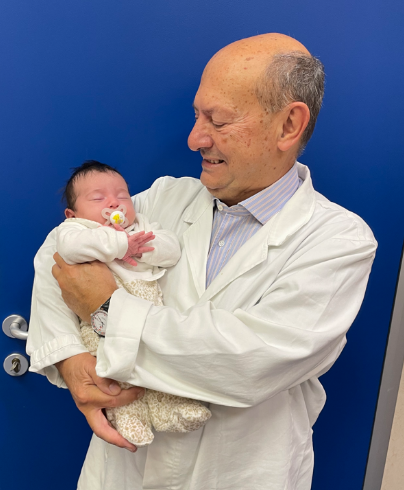The project of “starting a family” enters the lives of many couples at a certain point. They embark on the journey toward pregnancy with the joy of knowing they will soon hold in their arms the fruit of their love, often without imagining they may encounter the winding path of infertility.
Yet, as highlighted by data from the World Health Organization (WHO), cases of male and female infertility are on the rise, and the number of couples turning to Assisted Reproductive Technologies (ART) is steadily increasing.
The San Carlo Clinical Center for Gynecology and Assisted Reproduction in Turin, directed by Prof. Giovanni Menaldo, has been assisting couples with primary or secondary infertility for over 30 years and has already contributed to the birth of thousands of children, making possible the realization of a dream for many families.

Over the years, Prof Menaldo’s research and the innovative methods he has presented at national and international conferences have greatly enriched traditional infertility treatments. This applies both to homologous ART procedures (i.e., using gametes from the couple) and heterologous procedures with egg donation (oocytes from anonymous donors) or sperm donation (male gametes from anonymous donors).
The therapeutic strategy, successful in many cases, lies in the synergy of natural medicine, academic medicine, and regenerative medicine, always grounded in the utmost respect for male and female reproductive physiology. The aim is to achieve the long-awaited pregnancy while also safeguarding the delicate psychosomatic balance inevitably involved.
The careful work of Prof. Menaldo and his team focuses not only on new couples but also on those who have experienced failures with assisted reproduction. Every detail is analyzed scrupulously in search of that missing piece that could prove decisive. Nothing is left to chance, no path remains unexplored, because the objective is always clear: not just achieving pregnancy, but reaching the nine-month milestone with a baby in one’s arms.
Of great significance are the numerous studies authored by Prof. Menaldo and his team, some very recent with data collected in 2023, which have made it possible to develop innovative methods such as seminal fluid spectrophotometry, endometrial soft-scratching, ovarian and endometrial regeneration with PRP (platelet-rich plasma), energy-based phytotherapy, and others. All aimed at making the maternal uterus the ideal environment for embryo implantation.
What has always distinguished the San Carlo Clinical Center in Turin throughout its nearly forty years of experience in treating infertility is the planning of a personalized therapeutic pathway, tailored to the couple’s specific medical issues.
All the children born so far, and those still in their mothers’ wombs, are proof of how thorough clinical study, constant research into cutting-edge treatments, equipment and methods, patient care, and attention to detail make all the difference, especially in reproductive medicine: no patient is the same as another, every couple must be treated in an exclusive and individualized manner, and every body reacts differently. Every failure provides valuable lessons.
Among the many patients who turn daily to the San Carlo Center in Turin are couples who have only recently begun trying for a pregnancy and seek assistance when the first conception difficulties arise. Others, instead, arrive after long and difficult journeys marked by repeated assisted reproduction failures in other centers in Italy and abroad.
The in vitro fertilization journey is full of unexpected events, like an obstacle course: one may reach the finish line with a joy never experienced before, or get caught in a web of difficulties that are hard to escape.
Often, dreams that once seemed unreachable come true: very complex situations with serious male or female infertility issues—or both—cases deemed impossible in couples who had lost hope. These successes, sometimes extraordinary, provide the strength not to give up, not to be overwhelmed by inevitable moments of discouragement, and to always search for light at the end of the tunnel of infertility. Unfortunately, the expected outcome is not always achieved, and the disappointment of failure severely tests the emotional stability of even the strongest individuals.
Couples usually approach assisted reproduction with great enthusiasm, ready to welcome the outcome of such significant psychological and physical commitment. At times, however, they feel disoriented when things do not go as hoped. Prof. Menaldo, with extreme realism, presents patients with the various possibilities ahead, preparing them to rejoice in the case of success but also to endure setbacks, recover the necessary energy, and try again—because the desire for a child is a flame that, once lit, can hardly be extinguished.

